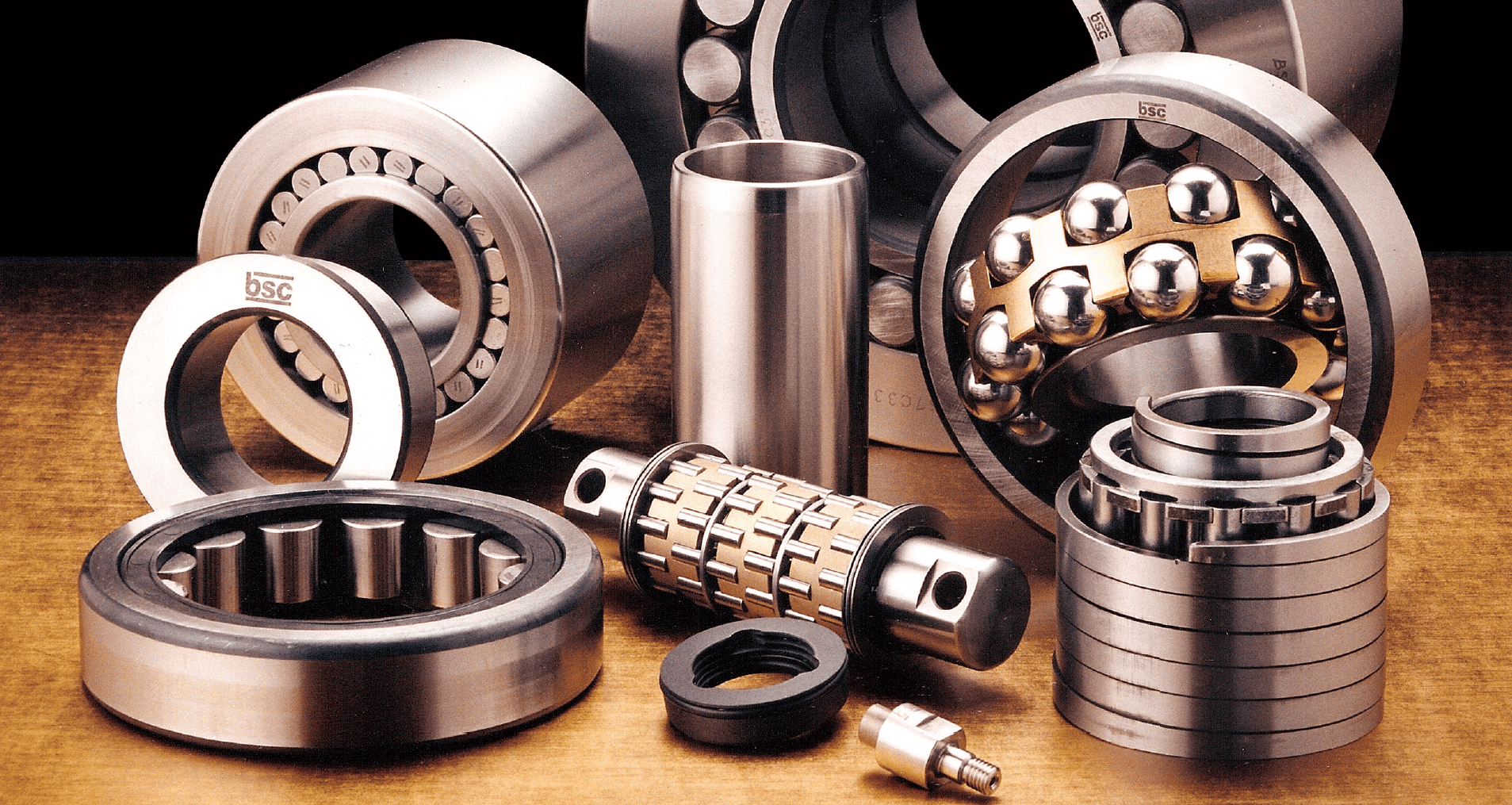
85+ Years of Service and Dedication
Family Owned. Family Operated. USA Made.
A Guide to Industrial Bearing Types: Comparing Advantages and Applications
Industrial bearings come in many different types and configurations. The conventional ball bearings that most commonly come to mind are only the tip of the iceberg. We use many other uniquely specialized bearing types to accommodate the complex performance requirements of modern machines and equipment throughout today’s industrial sector.
As a case in point, Bearing Service Company regularly manufactures and distributes both standard and custom configurations of:
- Industrial Ball Bearings
- Tapered Roller Bearings
- Tension Leveler Units
- Pillow Blocks and Take-Up Units
- Linear Bearings
- Cylindrical Roller Bearings
- Thrust Bearings
- Z-Mill Bearings
Customers who are new to the world of industrial bearings sometimes aren’t aware of the full list of options available to best accommodate their unique use cases. To that end, we’ve put together a basic overview that compares common industrial bearing types, along with some of their performance advantages and typical applications.
Ball Bearings
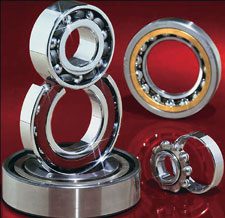 Ball bearings are the most conventional type of rolling-element bearing used in a wide range of various industrial applications. Industrial ball bearings find many diverse applications in the factory and in the field, commonly used to support many types of rotating shafts, axles, or other components while reducing friction and facilitating smooth motion.
Ball bearings are the most conventional type of rolling-element bearing used in a wide range of various industrial applications. Industrial ball bearings find many diverse applications in the factory and in the field, commonly used to support many types of rotating shafts, axles, or other components while reducing friction and facilitating smooth motion.
Conventional ball bearings consist of small, spherical balls that roll between the inner and outer raceways, allowing for low-friction rotation. Industrial ball bearings are essential components in numerous industrial machines and equipment.
Advantages of Industrial Ball Bearings:
- Exceptionally low coefficient of drag – promotes less wear, minimum maintenance, and a longer service life.
- Relatively simple in design – further facilitates reliability and a lower overall cost.
Cylindrical Roller Bearings
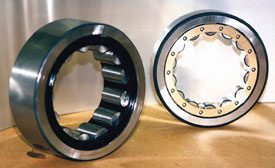 Cylindrical roller bearings are a type of rolling-element bearing commonly used in various industrial applications to provide support for rotating shafts or axles while minimizing friction and facilitating smooth motion. These bearings consist of cylindrical rollers, with or without a cage, designed to distribute loads and reduce friction of force in the radial direction.
Cylindrical roller bearings are a type of rolling-element bearing commonly used in various industrial applications to provide support for rotating shafts or axles while minimizing friction and facilitating smooth motion. These bearings consist of cylindrical rollers, with or without a cage, designed to distribute loads and reduce friction of force in the radial direction.
Advantages of Cylindrical Roller Bearings:
- Engineered for reliability – the cylindrical bearing design resists damage, fatigue, and shock better than ball bearings.
- Cylindrical roller bearings have a simpler design and can generally tolerate small amounts of misalignment better than conventional ball bearings.
Thrust Bearings
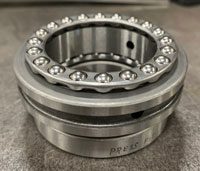 Industrial thrust bearings (common specific types being thrust ball bearings and thrust roller bearings) are a specific type of rolling-element bearing designed to support axial (thrust) loads, which are forces applied parallel to the axis of rotation. Some common types include:
Industrial thrust bearings (common specific types being thrust ball bearings and thrust roller bearings) are a specific type of rolling-element bearing designed to support axial (thrust) loads, which are forces applied parallel to the axis of rotation. Some common types include:
- Thrust Ball Bearings
- Angular Thrust Ball Bearings
- Thrust Roller Bearings
- Tapered Roller Thrust Bearings
- Spherical Thrust Roller Bearings
- Thrust Needle Bearings
Unlike cylindrical bearings, which are designed primarily to handle radial loads (perpendicular to the axis of rotation), thrust bearings are optimized to withstand and transmit axial loads while minimizing friction and facilitating smooth motion. These bearings are crucial in various industrial applications that present significant axial loads, such as cranes and mining equipment.
Advantages of Thrust Bearings:
- Industrial thrust bearings are designed for extremely low friction and smooth operation.
- Ideal for supporting high axial loads in various industrial equipment applications.
Z-Mill (Sendzimir) Bearings (Back-Up Bearings)
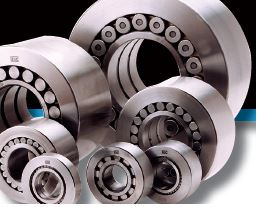 Z-mill or Sendzimir bearings, also commonly called back-up or backing bearings, are specialized rolling-element bearings used within the modern metalworking industry. Typical applications include cold rolling mills and other industrial mill operations that produce rolled steel products.
Z-mill or Sendzimir bearings, also commonly called back-up or backing bearings, are specialized rolling-element bearings used within the modern metalworking industry. Typical applications include cold rolling mills and other industrial mill operations that produce rolled steel products.
Back-up bearings are designed to withstand the extreme operating conditions and heavy loads involved in the industrial metal rolling process. In typical mill operations, the roller bearing is used to provide immense pressure to the workpiece metal, shaping it and reducing its thickness as it passes through the mill. Precision-built Z-mill bearings are a critical component to ensure that the work rolls continue to rotate smoothly and reliably. As such, the bearing components are specially engineered to meet the challenges posed by the severe working conditions, including extremely high loads and mechanical stress.
Spring Bearings (Eich Bearings)
 Spring bearings (commonly referred to as Eich bearings) is an extremely resilient, flexible roller bearing for the roughest applications. This unique industrial bearing design exhibits the greatest possible degree of resistance to the effects of heat, dirt, and shock loading, and can also be installed without difficulty in many problem areas. It also offers compact envelope dimensions.
Spring bearings (commonly referred to as Eich bearings) is an extremely resilient, flexible roller bearing for the roughest applications. This unique industrial bearing design exhibits the greatest possible degree of resistance to the effects of heat, dirt, and shock loading, and can also be installed without difficulty in many problem areas. It also offers compact envelope dimensions.
Advantages of Spring Bearings vs. Conventional Anti-Friction Bearings
Extremely resistant to damage from accumulated dirt and debris, spring bearings clean themselves due to spiral grooves designed into the bearing races. These grooves essentially act as a worm screw conveyor which forces debris to the outside of the race while simultaneously facilitating relubrication.
Spring bearings are engineered for superior thermal stability: the flexible races grow and shrink back to original size through repeated heating and cooling cycles, thus maintaining an internal radial clearance that corresponds to operating temperature. Due to the unique design of spring bearings, the thin wall section of its races allows the bearing to be installed in places where it’s often not possible to install other non-friction bearing types.
Quality American Manufacturing for Industrial Bearing Products Since 193
BSC is among the nation’s leading manufacturers, distributors, and repair sources for virtually all types of industrial bearing projects. Founded in 1933, we provide industry-leading experience and a more reliable supply chain solution for your critical bearing components.

